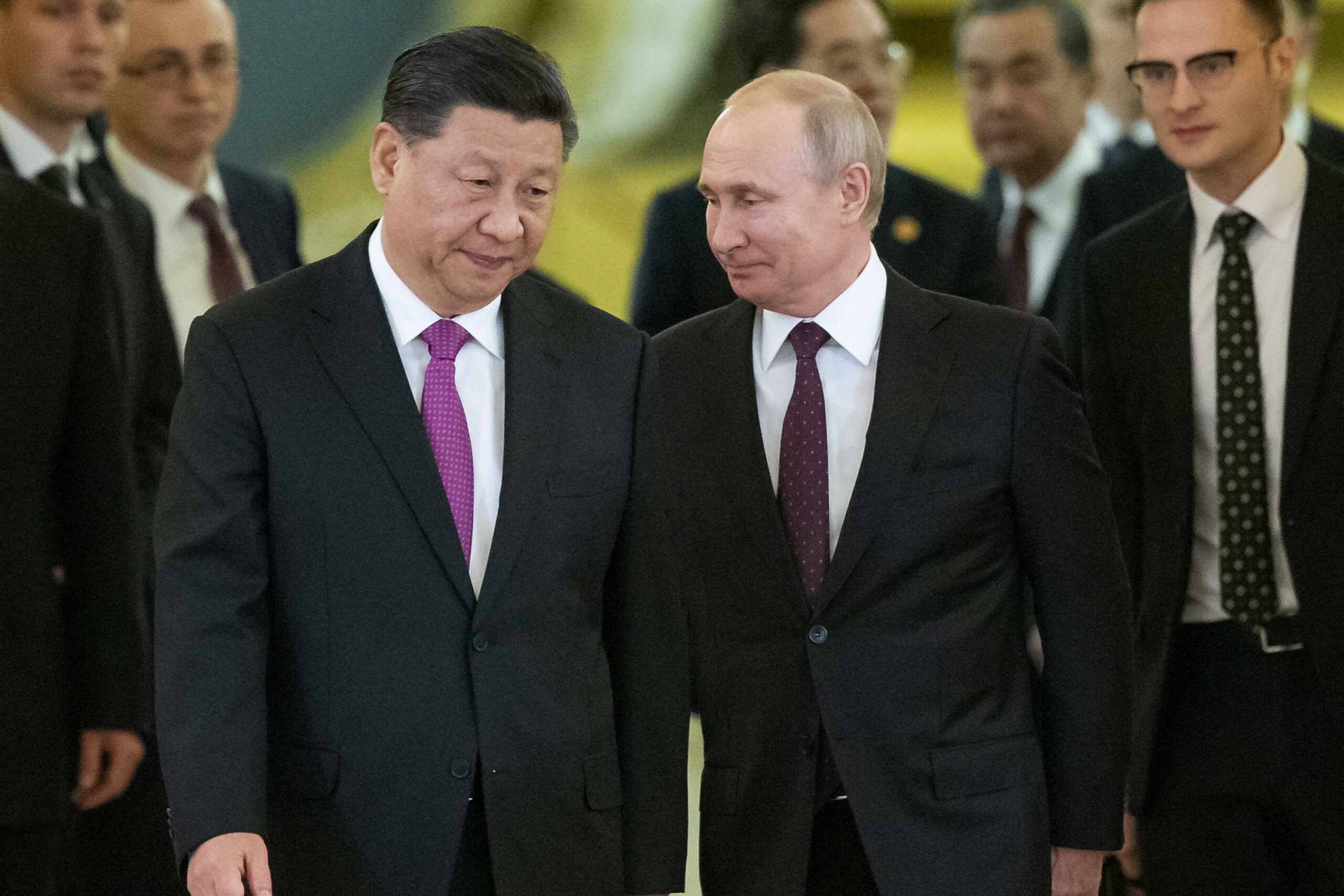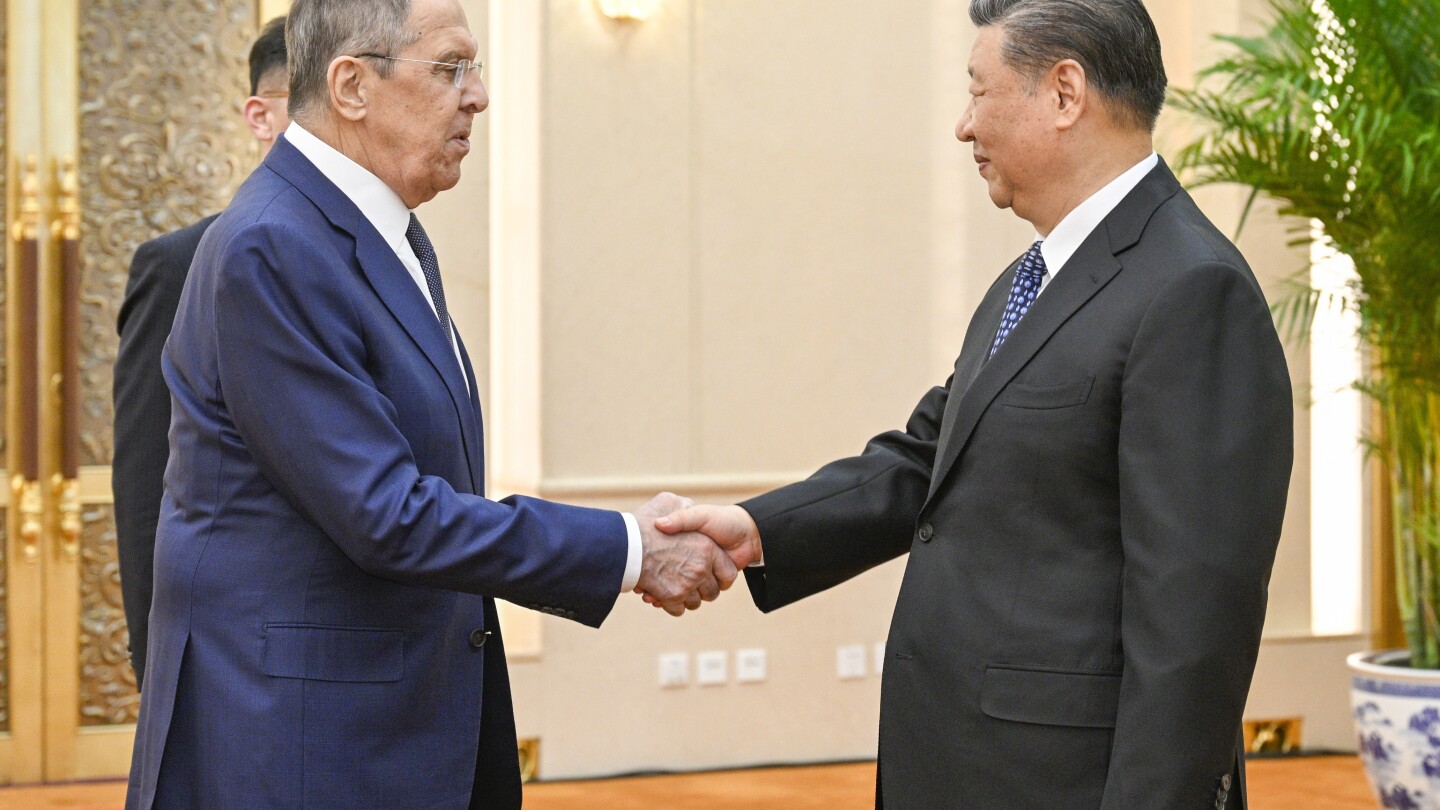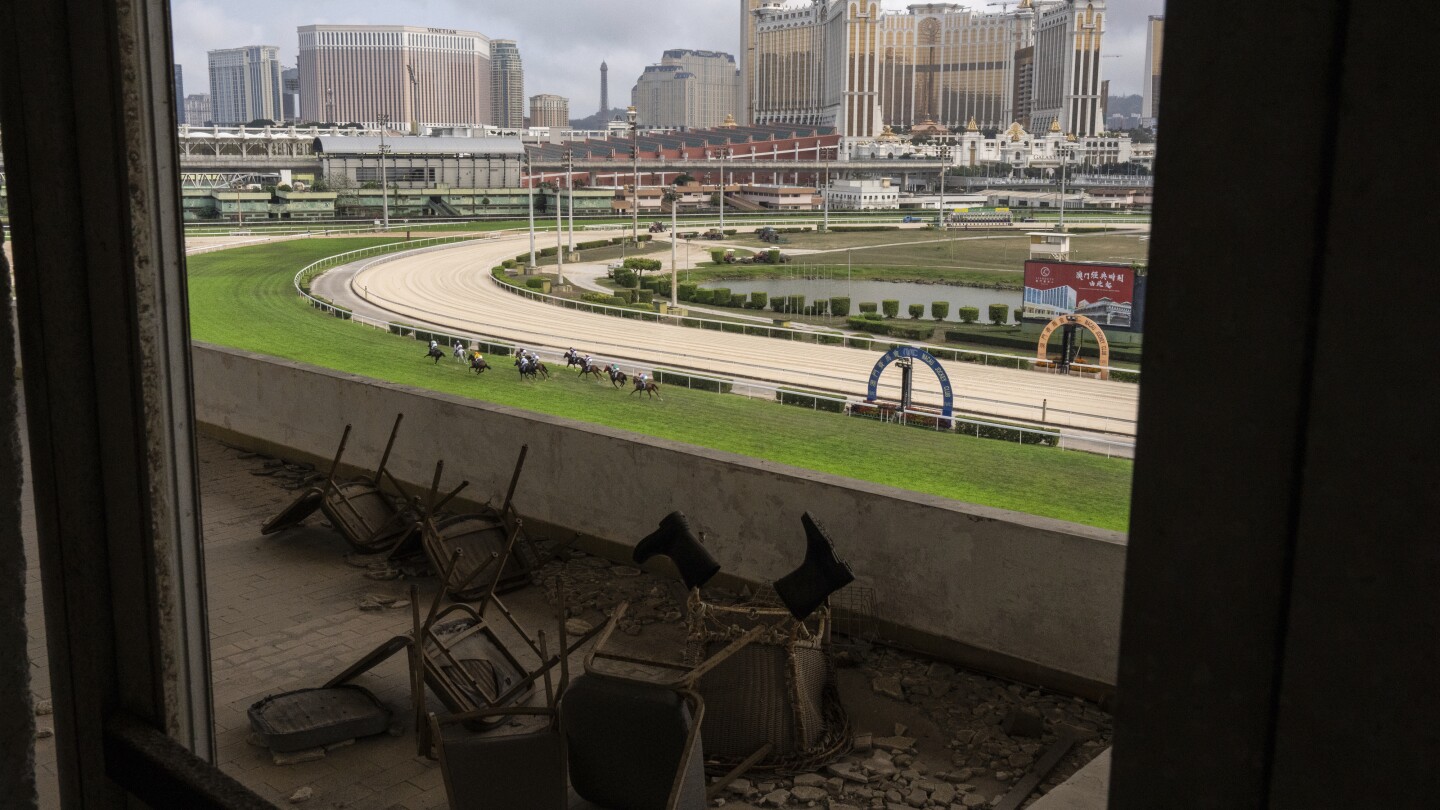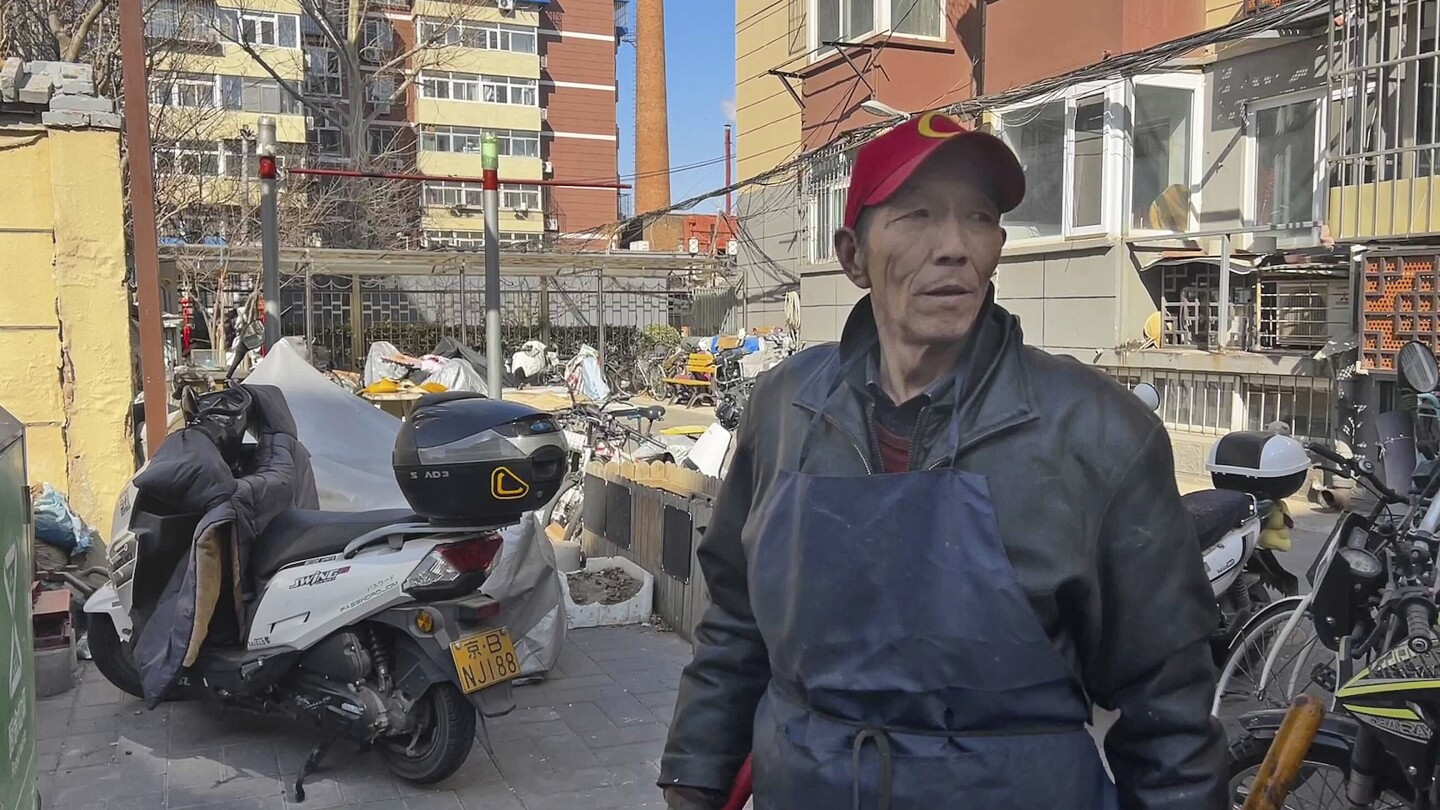China
Xi in Moscow for meeting with Putin…
Published
1 year agoon

MOSCOW (AP) — Russian President Vladimir Putin warmly welcomed Chinese leader Xi Jinping to the Kremlin on Monday, sending a powerful message to Western leaders that their efforts to isolate Moscow over the fighting in Ukraine have fallen short.
Xi’s trip — his first abroad since his re-election earlier this month — showed off Beijing’s new diplomatic swagger and gave a political lift to Putin just days after an international arrest warrant was issued for the Kremlin leader on war crimes charges related to Ukraine.
The two major powers have described Xi’s three-day trip as an opportunity to deepen their “no-limits friendship.” China looks to Russia as a source of oil and gas for its energy-hungry economy, and as a partner in standing up to what both see as U.S. aggression, domination of global affairs and unfair punishment for their human rights records.
The two countries, among the five U.N. Security Council’s permanent members, also have held joint military drills. U.S. officials have picked up indications China is considering supplying Russia with weapons for its fight in Ukraine but have seen no evidence they’ve actually done so.
The leaders smiled and shook hands before sitting down at the start of their meeting, calling each other “dear friend” and exchanging compliments. Putin congratulated Xi on his re-election and voiced hope for building even stronger ties.
“China has made a colossal leap ahead in its development in recent years,” Putin said, adding that “it’s causing genuine interest all around the world, and we even feel a bit envious,” as Xi smiled.
The Kremlin leader welcomed China’s proposals for a political settlement in Ukraine and noted Russia is open for talks.
“We will discuss all those issues, including your initiative that we highly respect,” Putin said. “Our cooperation in the international arena undoubtedly helps strengthen the basic principles of the global order and multipolarity.”
Both Moscow and Beijing have accused Washington of trying to isolate them and hold back their development as they challenge it for regional and global leadership.
In an increasingly multipolar world, the U.S. and its allies have been unable to build a broad front against Putin. While 141 countries condemned Moscow in a United Nations vote marking the first anniversary of Russian troops rolling into Ukraine, several members of the G-20 — including India, China and South Africa — abstained. Many African nations also have refrained from openly criticizing Russia.
“We hope that the strategic partnership between China and Russia will on the one hand uphold international fairness and justice, and on the other hand promote the common prosperity and development of our countries,” Xi said.
In their 4 1/2 hours of talks, along with a dinner that included a Pacific seafood platter and roast venison in cherry sauce, Putin would offer Xi a “detailed explanation” of Moscow’s actions in Ukraine, according to Kremlin spokesman Dmitry Peskov. Broader talks on a range of subjects are scheduled Tuesday.
For Putin, Xi’s presence is a prestigious, diplomatic boost to show partnership in the face of Western efforts to isolate Russia over Ukraine.
In an article published in the Chinese People’s Daily newspaper, Putin described Xi’s visit as a “landmark event” that “reaffirms the special nature of the Russia-China partnership” and said the meeting signaled that the two countries aren’t prepared to accept attempts to weaken them.
“The U.S. policy of simultaneously deterring Russia and China, as well as all those who do not bend to the American diktat, is getting ever fiercer and more aggressive,” he wrote.
China portrays Xi’s visit as part of normal diplomatic exchanges and has offered little detail about its purpose, though Foreign Ministry spokesperson Wang Wenbin told reporters Monday that China “will uphold its objective and fair position on the Ukrainian crisis and play a constructive role in promoting peace talks.” Xi didn’t directly mention the Ukraine fighting or his peace plan when he sat down for the talks with Putin.
Beijing’s leap into Ukraine issues follows its recent success in brokering talks between Iran and its chief Middle Eastern rival, Saudi Arabia, which agreed to restore their diplomatic ties after years of tensions.
Following that success, Xi called for China to play a bigger role in managing global affairs.
Although they boast of a “no-limits” partnership, Beijing has conducted a China First policy. It has refrained from supplying Russia’s military — a move that could worsen relations with Washington and turn important European trade partners against China. On the other hand, it has refused to condemn Moscow’s aggression and criticized Western sanctions against Moscow, while accusing NATO and the United States of provoking Putin’s military action.
Western pressure has made Russia increasingly reliant on Beijing, observers said.
Alexander Gabuev, a senior fellow at the Carnegie Endowment, noted that Beijing is aiming at “getting Russia as a junior partner deeper into China’s pocket.”
Dmitry Oreshkin, professor at Free University in Riga, Latvia, observed that Beijing benefits from tensions between Moscow and the West, by gaining access to cheap Russian energy resources. “It’s very convenient for China, which couldn’t get such a discount before,” he said.
China last month called for a cease-fire and peace talks. Ukrainian President Volodymyr Zelenskyy cautiously welcomed Beijing’s involvement, but the overture fizzled.
White House National Security Council spokesman John Kirby urged Xi “to press President Putin directly on the need to respect Ukraine’s sovereignty and territorial integrity.” He also said the U.S. administration believes Xi could play “a constructive role” by speaking directly with Zelenskyy.
The Kremlin has welcomed China’s peace plan, while U.S. Secretary of State Antony Blinken said Monday any proposal that left Russian forces in place in Ukraine would merely let Moscow reequip and otherwise regain strength to resume its offensive.
“Calling for a cease-fire that does not include the removal of Russian forces from Ukrainian territory would effectively be supporting the ratification of Russian conquest,” he told reporters in Washington. “The world should not be fooled by any tactical move by Russia, supported by China or any other country, to freeze the war on its own terms.”
Kyiv officials say they won’t bend in their terms for a peace accord.
Ukraine’s allies, meanwhile, are stepping up their support. The State Department announced Monday that the U.S. will send Ukraine $350 million in weapons and equipment. The latest aid package includes ammunition, such as rockets for the High Mobility Artillery Rocket Systems, fuel tanker trucks and riverine boats.
In Brussels, European Union countries endorsed a fast-track procedure to provide Ukraine with artillery shells, EU foreign policy chief Josep Borrell said. He hailed “a historic decision” for the 27-nation bloc and Norway to send Ukraine 1 million 155 mm artillery shells within 12 months.
Xi’s trip came after the International Criminal Court in The Hague announced Friday it wants to put Putin on trial for the abductions of thousands of children from Ukraine.
The Kremlin doesn’t recognize the court’s authority and has rejected its move against Putin as “legally null and void.” China, the U.S. and Ukraine also don’t recognize the ICC, but the decision tarnished Putin’s international standing.
China’s Foreign Ministry urged the ICC to “respect the jurisdictional immunity” of a head of state and “avoid politicization and double standards.”
Russia’s Investigative Committee retaliated Monday by opening a criminal case against a prosecutor and three judges of the ICC over the arrest warrants issued for Putin and his commissioner for children’s rights, Maria Lvova-Belova. The committee called the ICC’s prosecution “unlawful” because it was, among other things, a “criminal prosecution of a knowingly innocent person.”
___
Follow the AP’s coverage of Ukraine at https://apnews.com/hub/russia-ukraine
___
Associated Press writer Ellen Knickmeyer in Washington contributed.


WASHINGTON (AP) — China has surged sales to Russia of machine tools, microelectronics and other technology that Moscow in turn is using to produce missiles, tanks, aircraft and other weaponry for use in its war against Ukraine, according to a U.S. assessment.
Two senior Biden administration officials, who discussed the sensitive findings Friday on the condition of anonymity, said that in 2023 about 90% of Russia’s microelectronics came from China, which Russia has used to make missiles, tanks and aircraft. Nearly 70% of Russia’s approximately $900 million in machine tool imports in the last quarter of 2023 came from China.
Chinese and Russian entities have also been working to jointly produce unmanned aerial vehicles inside Russia, and Chinese companies are likely providing Russia with nitrocellulose used in the manufacture of ammunition, the officials said. China-based companies Wuhan Global Sensor Technology Co., Wuhan Tongsheng Technology Co. Ltd. and Hikvision are providing optical components for use in Russian tanks and armored vehicles.
The officials said Russia has received military optics for use in tanks and armored vehicles manufactured by Chinese firms iRay Technology and North China Research Institute of Electro-Optics, and China has been providing Russia with UAV engines and turbojet engines for cruise missiles.
Russia’s semiconductor imports from China jumped from $200 million in 2021 to over $500 million in 2022, according to Russian customs data analyzed by the Free Russia Foundation, a group that advocates for civil society development.
Beijing is also working with Russia to improve its satellite and other space-based capabilities for use in Ukraine, a development the officials say could in the longer term increase the threat Russia poses across Europe. The officials, citing downgraded intelligence findings, said the U.S. has also determined that China is providing imagery to Russia for its war on Ukraine.
The officials discussed the findings as Secretary of State Antony Blinken is expected to travel to China this month for talks. Blinken is scheduled to travel next week to the Group of 7 foreign ministers meeting in Capri, Italy, where he’s expected to raise concerns about China’s growing indirect support for Russia as Moscow revamps its military and looks to consolidate recent gains in Ukraine.
President Joe Biden has previously raised his concerns directly with Chinese President Xi Jinping about Beijing indirectly supporting Russia’s war effort.
While China has not provided direct lethal military support for Russia, it has backed it diplomatically in blaming the West for provoking Russian President Vladimir Putin’s decision to launch the war and refrained from calling it an invasion in deference to the Kremlin.
China has repeatedly said it isn’t providing Russia with arms or military assistance, although it has maintained robust economic connections with Moscow, alongside India and other countries, amid sanctions from Washington and its allies.
“The normal trade between China and Russia should not be interfered or restricted,” said Liu Pengyu, spokesman of the Chinese Embassy in Washington. “We urge the U.S. side to refrain from disparaging and scapegoating the normal relationship between China and Russia.”
Xi met in Beijing on Tuesday with Russian Foreign Minister Sergey Lavrov, who heaped praise on Xi’s leadership.
Russia’s growing economic and diplomatic isolation has made it increasingly reliant on China, its former rival for leadership of the Communist bloc during the Cold War.
Treasury Secretary Janet Yellen, who returned to Washington this week from a visit to Beijing, said she warned Chinese officials that the Biden administration was prepared to sanction Chinese banks, companies and Beijing’s leadership, if they assist Russia’s armed forces with its ongoing invasion of Ukraine.
The Democratic president issued an executive order in December giving Yellen the authority to sanction financial institutions that aided Russia’s military-industrial complex.
“We continue to be concerned about the role that any firms, including those in the PRC, are playing in Russia’s military procurement,” Yellen told reporters, using the initials for the People’s Republic of China. “I stressed that companies, including those in the PRC, must not provide material support for Russia’s war and that they will face significant consequences if they do. And I reinforced that any banks that facilitate significant transactions that channel military or dual-use goods to Russia’s defense industrial base expose themselves to the risk of U.S. sanctions.”
The U.S. has frequently downgraded and unveiled intelligence findings about Russia’s plans and operations over the course of the more than 2-year-old war with Ukraine.
Such efforts have been focused on highlighting plans for Russian misinformation operations or to throw attention on Moscow’s difficulties in prosecuting its war against Ukraine as well as its coordination with Iran and North Korea to supply it with badly needed weaponry. Blinken last year spotlighted intelligence that showed China was considering providing arms and ammunition to Russia.
The White House believes that the public airing of the intelligence findings has led China, at least for now, to hold off on directly arming Russia. China’s economy has also been slow to emerge from the COVID-19 pandemic. Chinese officials could be sensitive to reaction from European capitals, which have maintained closer ties to Beijing even as the U.S.-China relationship has become more complicated.
Meanwhile, China on Thursday announced rare sanctions against two U.S. defense companies over what it called their support for arms sales to Taiwan, the self-governing island democracy Beijing claims as its own territory to be recovered by force if necessary.
The announcement freezes the assets of General Atomics Aeronautical Systems and General Dynamics Land Systems held within China. It also bars the companies’ management from entering the country.
Filings show General Dynamics operates a half-dozen Gulfstream and jet aviation services operations in China, which remains heavily reliant on foreign aerospace technology even as it attempts to build its own presence in the field.
The company also helps make the Abrams tank being purchased by Taiwan to replace outdated armor intended to deter or resist an invasion from China.
General Atomics produces the Predator and Reaper drones used by the U.S. military.
___
AP writers Didi Tang and Fatima Hussein contributed reporting.
China
China’s gambling hub of Macao holds its its final horse race, ending a tradition of over 40 years
Published
3 months agoon
March 30, 2024
MACAO (AP) — After more than 40 years, Macao’s horse racing track hosted its final races on Saturday, bringing an end to the sport in the city famous for its massive casinos.
In January, the city’s government said it would terminate its contract with the Macao Jockey Club in April. The decision came at the request of the Macao Horse Race Company, which cited operational challenges as part of the reasons for the closure.
On Saturday, gamblers congregated in the half-full stands and placed their final bets. Some tourists also visited the track.
Mai Wan-zun, a student from mainland China in Macao, said she wanted to get a taste of the atmosphere. “We could come to see horse racing here in Macao, but not in mainland China,” she said.
Helena Chong, a Macao resident, decided to visit the race course for the first and last time to see what it’s all about.
“It’s a pity to see the end of all this gambling and entertainment,” she said.
Horse racing in the former Portuguese colony has struggled with economic challenges in recent years and has yet to rebound from the impacts of the COVID-19 pandemic. Its jockey club had accumulated operating losses of over $311 million, the Macau News Agency earlier reported.
Under the termination arrangement, the horse racing firm had pledged to arrange for transportation of owners’ horses to other locations by March 2025, and handle the company’s employees according to the law, the government said.
In neighboring Hong Kong, horse-racing remains popular and profitable. Its jockey club runs various gambling activities and is the city’s major donor of many charity works.
China
Migrant workers who helped build modern China have scant or no pensions, and can’t retire
Published
3 months agoon
March 28, 2024
BEIJING (AP) — At 53, Guan Junling is too old to get hired at factories anymore. But for migrant workers like her, not working is not an option.
For decades, they have come from farming villages to find work in the cities. Toiling in sweatshops and building apartment complexes they could never afford to live in, they played a vital role in China’s transformation into an economic powerhouse.
As they grow older, the first generation of migrant workers is struggling to find jobs in a slowing economy. Many are financially strapped, so they have to keep looking.
“There is no such thing as a ‘retirement’ or ‘pensions’ for rural people. You can only rely on yourself and work,” Guan said. “When can you stop working? It’s really not until you have to lie in bed and you can’t do anything.”
She now relies on housecleaning gigs, working long days to squirrel away a little money in case of a health emergency. Migrant workers can get subsidized health care in their hometowns, but they have little or no coverage elsewhere. If Guan needs to go to hospital in Beijing, she has to pay out of pocket.
As China’s population ages, so are its migrant workers. About 85 million were over 50 in 2022, the latest year for which data is available, accounting for 29% of all migrant workers and up from 15% a decade earlier. With limited or no pensions and health insurance, they need to keep working.
About 75% said they would work beyond the age of 60 in a questionnaire distributed to 2,500 first-generation migrant workers between 2018 to 2022, according to Qiu Fengxian, a scholar on rural sociology who described her research in a talk last year. The first-generation refers to those born in the 1970s or earlier.
Older workers are being hit by a double whammy. Jobs have dried up in construction due to a downturn in the real estate market and in factories because of automation and the slowing economy. Age discrimination is common, so jobs tend to go to younger people.
“For young people, of course, you can still find a job, positions are available, though the wage is not high enough,” said Zhang Chenggang of Beijing’s Capital University of Economics and Business, where he directs a center researching new forms of employment.
“But for older migrant workers, there simply are no positions,” said Zhang, who conducted field studies at four labor markets across China late last year. “Now, the problem is that no matter how low the wage is, as long as someone pays, you will take the job.”
Some job recruiters contacted by AP said older workers don’t work well or have underlying illnesses. Others declined to answer and hung up.
Many are turning to temporary work. Zhang Zixing was looking for gigs on a cold winter day late last year at a sprawling outdoor labor market on the outskirts of Beijing.
He said he was fired from a job delivering packages because of his age about three years ago, when he reached 55. In December, he was earning 260 yuan (about $35) a day installing cables at construction sites.
Zhang Quanshou, a village official in Henan province and a delegate to China’s National People’s Congress, said some older migrant workers are just looking for work near their hometowns, while others still head to larger cities.
“Some older migrant workers are finding temporary jobs, so it is important to build the temporary job market and provide a better platform for such services,” Zhang, the Communist Party secretary of the village, said in an emailed response to questions during a recent annual meeting of the Congress.
Guan, who comes from a rice-farming region in the north, worked on a clothing factory assembly line until she was laid off when she was in her 40s. She then worked various jobs in different cities, winding up in Beijing in 2018.
She works seven days a week, partly because she’s afraid labor agencies won’t call again if she turns an offer down.
Over February’s Lunar New Year holiday, when migrant workers traditionally go home to visit their families, she stayed in Beijing as a caretaker for an elderly woman, because the woman needed help and she needed the money.
“People either want someone who’s educated or young, and I don’t meet either of those requirements,” said Guan, who dropped out after middle school because her parents had only enough money to educate their son. “But then I think, regardless of how other people look at me, I have to survive.”
Guan worries jobs will be even harder to find when she reaches 55. The retirement age for women in China is 50 or 55, depending on the company and type of work. For men, it is 60.
Lu Guoquan, a trade union official, has proposed relaxing age limits for jobs, judging workers by their physical condition instead of their age and making it easier for older people to find work through labor markets and online platforms.
“A large number of farmers have entered cities, making an important contribution to the modernization of our country,” said his proposal, made to an advisory body during the recent national congress and seen by the AP.
As workers grow older, “they are gradually becoming a relatively vulnerable group in the labor market and face a number of thresholds and problems in continuing to work,” it said.
Lu, director of the general office of the All-China Federation of Trade Unions, declined an interview request.
Duan Shuangzhu has spent 25 years collecting trash in one Beijing neighborhood after giving up a life of raising sheep and cows in north China’s Shanxi province when he was in his 40s. He gets up at 3:30 a.m. seven days a week to make his rounds. For that, he earns 3,300 yuan ($460) a month and has a basement room to live in.
Duan’s wife stayed on the farm, where she looks after their grandchildren. Duan has managed to save money for himself, his children and his grandchildren, but never paid into a pension system, directing what little he earns to his family.
That fits the pattern Qiu found in her research, which she published in a book last year. Older migrant workers moved to the cities to improve the lives of their children and other relatives, not themselves, she found. Most have limited or no savings, and few have climbed the economic ladder. They hoped their children would, but most ended up as migrant workers, too.
Most migrant workers’ earnings were spent on their children’s marriages, homes and education, Qiu said in her talk. “Basically, they did not begin working for themselves and planning for their own late years until the age of 55.”
Duan, at 68, has no plans to quit.
“As long as I can work every day, it’s enough to survive,” he said, standing next to a set of community rubbish bins, color-coded for recycling. “I didn’t grow up in a wealthy family — just filling my stomach each day is enough for me.”
___
Associated Press researcher Wanqing Chen contributed to this story.







